Hyundai i30 vs Mitsubishi Space Star – Differences & prices compared
Compare performance, boot space, consumption and price in one view.
Find out now: which car is the better choice for you – Hyundai i30 or Mitsubishi Space Star?
The Hyundai i30 (Hatchback) comes with a Petrol or Petrol MHEV engine and Manuel or Automatic transmission. In comparison, the Mitsubishi Space Star (Hatchback) features a Petrol engine with Manuel or Automatic transmission.
When it comes to boot capacity, the Hyundai i30 offers 395 L, while the Mitsubishi Space Star provides 235 L – depending on how much space you need. If you’re looking for more power, decide whether the 140 HP of the Hyundai i30 or the 71 HP of the Mitsubishi Space Star suits your needs better.
In terms of consumption, the values are 5.70 L per 100 km for the Hyundai i30, and 4.90 L for the Mitsubishi Space Star.
Price-wise, the Hyundai i30 starts at 24000 £, while the Mitsubishi Space Star is available from 11600 £. Compare all the details and find out which model fits your lifestyle best!
Hyundai i30
The Hyundai i30 stands out in the hatchback segment with its sleek design and modern features. It offers a comfortable ride with a well-crafted interior that caters to both driver and passengers. With its emphasis on safety and technology, the i30 provides a balanced driving experience suitable for urban and suburban environments.
details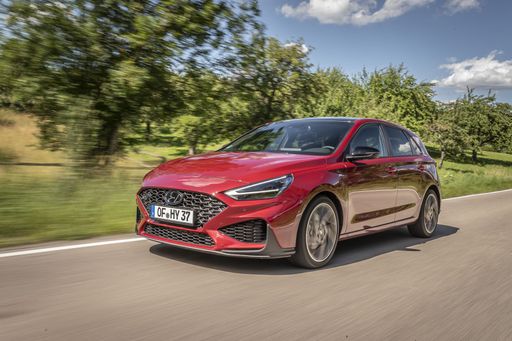 @ hyundai.news
@ hyundai.news
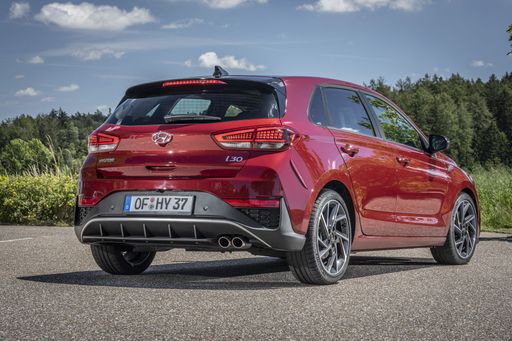 @ hyundai.news
@ hyundai.news
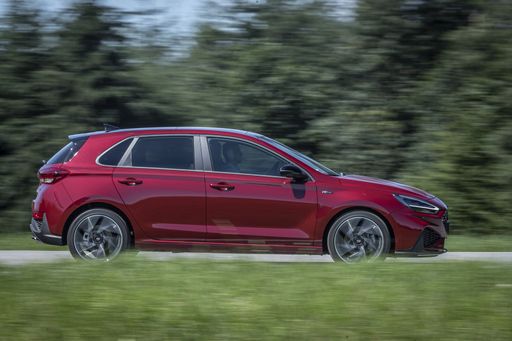 @ hyundai.news
@ hyundai.news
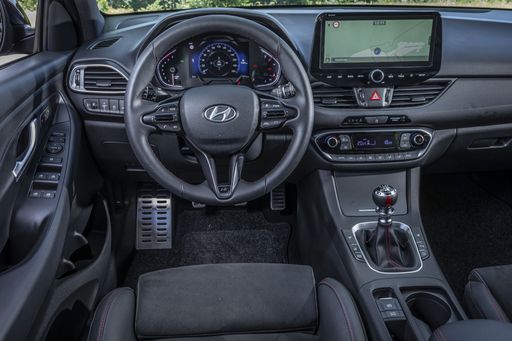 @ hyundai.news
@ hyundai.news
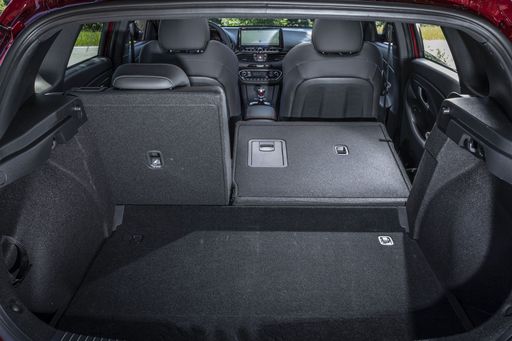 @ hyundai.news
@ hyundai.news
Mitsubishi Space Star
The Mitsubishi Space Star offers a compact yet surprisingly spacious experience, making it an ideal choice for urban dwellers who need agility and comfort. Its sleek design is complemented by a range of vibrant colour options, adding a touch of flair to everyday commutes. With a focus on efficiency and practicality, the Space Star combines a user-friendly interface with modern technology to ensure a smooth driving experience.
details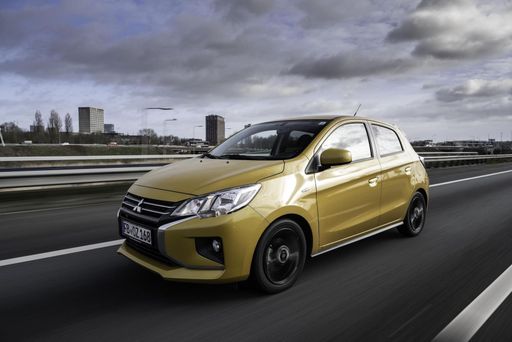 @ presse.mitsubishi-motors.de
@ presse.mitsubishi-motors.de
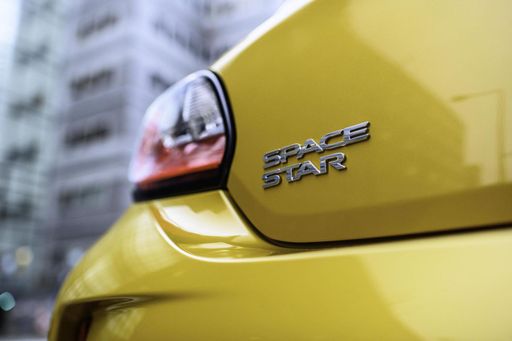 @ presse.mitsubishi-motors.de
@ presse.mitsubishi-motors.de
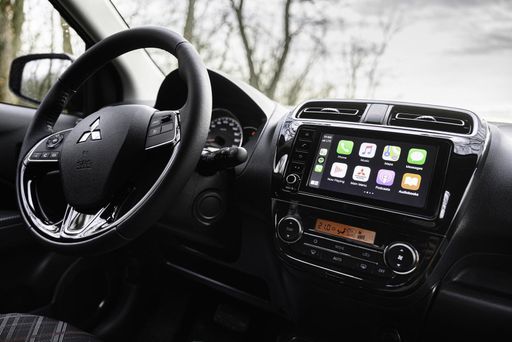 @ presse.mitsubishi-motors.de
@ presse.mitsubishi-motors.de
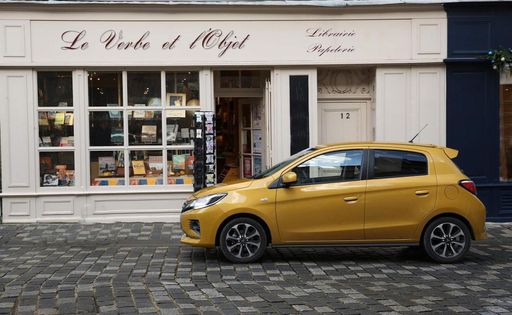 @ presse.mitsubishi-motors.de
@ presse.mitsubishi-motors.de

|

|
|
|
|
Costs and Consumption |
|
|---|---|
|
Price
24000 - 29300 £
|
Price
11600 - 18700 £
|
|
Consumption L/100km
5.7 - 6 L
|
Consumption L/100km
4.9 - 5.5 L
|
|
Consumption kWh/100km
-
|
Consumption kWh/100km
-
|
|
Electric Range
-
|
Electric Range
-
|
|
Battery Capacity
-
|
Battery Capacity
-
|
|
co2
130 - 136 g/km
|
co2
112 - 125 g/km
|
|
Fuel tank capacity
50 L
|
Fuel tank capacity
35 L
|
Dimensions and Body |
|
|---|---|
|
Body Type
Hatchback
|
Body Type
Hatchback
|
|
Seats
5
|
Seats
5
|
|
Doors
5
|
Doors
5
|
|
Curb weight
1291 - 1407 kg
|
Curb weight
940 - 1009 kg
|
|
Trunk capacity
395 L
|
Trunk capacity
209 - 235 L
|
|
Length
4340 mm
|
Length
3845 mm
|
|
Width
1795 mm
|
Width
1665 mm
|
|
Height
1455 mm
|
Height
1505 mm
|
|
Payload
463 - 509 kg
|
Payload
360 - 400 kg
|
Engine and Performance |
|
|---|---|
|
Engine Type
Petrol, Petrol MHEV
|
Engine Type
Petrol
|
|
Transmission
Manuel, Automatic
|
Transmission
Manuel, Automatic
|
|
Transmission Detail
Manual Gearbox, Dual-Clutch Automatic
|
Transmission Detail
Manual Gearbox
|
|
Drive Type
Front-Wheel Drive
|
Drive Type
Front-Wheel Drive
|
|
Power HP
100 - 140 HP
|
Power HP
71 HP
|
|
Acceleration 0-100km/h
9.6 - 13.1 s
|
Acceleration 0-100km/h
14.1 - 15.8 s
|
|
Max Speed
178 - 197 km/h
|
Max Speed
163 - 167 km/h
|
|
Torque
172 - 253 Nm
|
Torque
102 Nm
|
|
Number of Cylinders
3 - 4
|
Number of Cylinders
3
|
|
Power kW
74 - 103 kW
|
Power kW
52 kW
|
|
Engine capacity
998 - 1482 cm3
|
Engine capacity
1193 cm3
|
General |
|
|---|---|
|
Model Year
2024
|
Model Year
2020 - 2023
|
|
CO2 Efficiency Class
D, E
|
CO2 Efficiency Class
C, D
|
|
Brand
Hyundai
|
Brand
Mitsubishi
|
Hyundai i30
Introducing the Hyundai i30: A Blend of Performance and Innovation
The Hyundai i30 continues to impress the automotive world with its fine balance of performance, efficiency, and cutting-edge technology. As a quintessential hatchback, the i30 caters to a diverse range of drivers, offering a remarkable driving experience through its impressive powertrains and compact yet stylish design.
Dynamic Performance Options
At the heart of the Hyundai i30 lies a variety of engine choices designed to suit different driving preferences. The power output ranges from 100 PS to 280 PS, allowing drivers to choose an i30 that perfectly matches their performance needs. Whether you're inclined towards the spirited drive of the N Performance variants or prefer the efficiency of the mild hybrid versions, there’s a powertrain tailored for you.
Innovative Hybrid Technology
For those seeking enhanced fuel efficiency without compromising on power, the i30’s 48V mild-hybrid system offers a compelling option. Available with both manual and automatic transmissions, this innovative technology provides an ideal balance, reducing emissions and improving fuel consumption, with an impressive average of just 5.7 L/100km.
Sophisticated Design and Features
The Hyundai i30’s sleek design is complemented by thoughtful interior features that elevate the driving experience. With a boot space ranging from 395 to 450 litres, this hatchback ensures ample room for all your luggage needs. Furthermore, the car's aesthetic appeal is matched by its practical ergonomic layout, catering to both style enthusiasts and those seeking functionality.
Advanced Safety and Technology
The i30 is equipped with an array of advanced safety features, enhancing driver confidence and ensuring passenger safety. Its cutting-edge safety suite includes lane-keeping assist, forward collision warning, and adaptive cruise control. Additionally, the i30 offers a modern infotainment system, designed to keep you connected and entertained on every journey.
Conclusion: A Versatile Choice for Modern Drivers
The Hyundai i30 is more than just a hatchback; it’s a remarkable amalgamation of power, efficiency, and modern technology. Whether you're enticed by the high-performance models or the eco-friendly mild-hybrid variants, the i30 stands out as a versatile choice that meets the demands of today’s discerning drivers.
Mitsubishi Space Star
Introducing the Mitsubishi Space Star: A Perfect Blend of Efficiency and Innovation
The Mitsubishi Space Star continues to impress urban drivers with its compact yet efficient design. Celebrated for its practicality and fuel economy, this hatchback offers a unique blend of new-age technology and reliable performance. Let’s dive into some of the technical details and innovations that make the Space Star a popular choice among compact car enthusiasts.
Engine and Performance
The Space Star is powered by a 1.2-litre, 3-cylinder petrol engine, delivering a respectable 71 PS (52 kW). The engine provides a harmonious balance of power and efficiency, reaching a top speed of up to 167 km/h. With a torque of 102 Nm, drivers can expect smooth city rides and decent highway cruising capabilities. The Space Star's economy ranges from 4.9 to 5.5 litres per 100 kilometres, ensuring that your journeys remain budget-friendly and environmentally considerate.
Transmission and Driving Dynamics
When it comes to the driving experience, buyers have the option of a 5-speed manual transmission or a CVT automatic. This flexibility allows for a more personalised driving experience, whether you prefer the engagement of manual shifting or the convenience of an automatic gearbox. The car's front-wheel-drive setup further enhances its maneuverability, making it an ideal companion for navigating tight city streets.
Design and Dimensions
The Mitsubishi Space Star is designed to turn heads with its sleek, aerodynamic lines while maintaining a practical size. Measuring 3845 mm in length, 1665 mm in width, and 1505 mm in height, it's a perfect fit for urban driving. Despite its compact form, the Space Star offers five seats and five doors, providing ample accessibility and comfort for both the driver and passengers.
Interior Features and Comfort
Inside, the Space Star prioritises comfort and convenience with thoughtfully designed interiors. The luggage space ranges from 209 to 235 litres, ideal for shopping trips or weekend getaways. The vehicle comes in a variety of trim levels, including Basis, Plus, Select, and Top, with each offering distinct features to meet different customer needs. Whether you need basic amenities or more premium touches, the Space Star has a version that will suit your lifestyle.
Safety and Environmental Impact
Safety innovation is a hallmark of the Mitsubishi Space Star, ensuring peace of mind for drivers and passengers alike. Its CO2 efficiency class ranges from C to D, with emissions between 112 to 125 g/km, reflecting its dedication to reducing the environmental footprint. These features contribute to making the Space Star a responsible choice for the eco-conscious driver.
Cost of Ownership
Affordability is another attractive aspect of the Space Star. Prices range from €13,590 to €21,790, making it accessible for a wide array of budgets. Running costs are equally competitive, with monthly expenses estimated between €627 and €767, and cost per kilometre ranging from 25.1 to 30.7 cents, all contributing to a car that is as economical to own as it is to drive.
Conclusion
In summary, the Mitsubishi Space Star offers a compelling package of efficiency, practicality, and modern technology. Its combination of fuel economy, flexible transmission options, and affordability make it a standout choice in the compact car segment. For those looking for a reliable and economical city car, the Space Star remains a strong contender that shouldn't be overlooked.
The prices and data displayed are estimates based on German list prices and may vary by country. This information is not legally binding.
